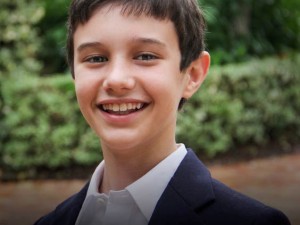As America’s Top Young Scientist, Peyton Robertson has a lot of responsibility weighing on his shoulders – and he seems more than up for the task. The 12-year-old has already filed for three patents and is the youngest person to ever win the Discovery Education 3M Young Scientist Challenge, a $25,000 award. His recent work to prevent hurricane flooding might keep him on the media’s radar for good.
After observing flood damage in his hometown of Fort Lauderdale, Florida, Robertson began concocting a better way to alleviate damage during the hurricane season. He invented a more efficient “sandbag” that uses an expandable polymer and salt to absorb flood waters and block them from traveling into populated areas. Since his sandbags don’t actually use sand, they are more lightweight and easier to transport than traditional sandbags. Plus, the added salt makes the bags heavier than the flood waters. Robertson also invented a system for interlocking the sandbags so that less water seeps between gaps, like in traditional sandbags. Once Robertson’s sandbags dry up after a storm they are ready to be reused, making Robertson’s product sustainable.
Learn more about Robertson’s project in the video below:
In an interview with TED, Robertson advises other kids who want to get involved in solving problems in their areas to start by listing all the problems in their neighborhoods. “Odds are those problems will be more interesting to you, provide more local resources to access and ultimately prove to be issues with a broad global impact,” he said.
When it comes to success, Robertson knows failure is an essential part of finding a solution:
Failure is progress and a normal part of the process. Whether it’s science or life, you have to start, fail and just keep pushing. In a football game, time runs out, and a golf match ends after the last hole. But when you are working on something and it doesn’t work, you just extend the game – and give your experiment or your prototype another go.
What are young scientists working on in your neck of the woods?
Featured image by TED



